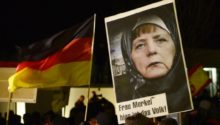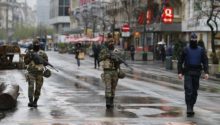contributors
Vladimir Nesterov

Independent analyst and researcher
all articles


In 2015, 1.83 million migrants arrived in Europe, of which 1.1 million officially wanted to seek asylum in Germany. And that’s not all – there are also the illegal immigrants, of which there are hundreds of thousands in the country, according to Alternative for Germany leader Frauke Petry. It was hoped that Europe would get some respite after such a powerful migration explosion that would allow the situation to get back to normal, but the findings of researchers are discouraging…


The Bloomberg news agency has named a number of European countries that its experts believe may soon turn into hotbeds of instability. These include Germany, Spain, Austria and the Netherlands. Great Britain, Lithuania, the Czech Republic, Romania, Croatia and Hungary can also be included for their part in furthering the region’s instability. The news agency links any possible unrest to the forthcoming parliamentary, presidential and local elections in these countries, as well as the forthcoming referendums…


On June 6 NATO began its BALTOPS naval exercises in the Baltics. These have been held every year since 1971, but this is the first time that forces from that military bloc – including 200 US troops – have landed in Finland, which is not a NATO member. They came ashore on the Hanko Peninsula, where a Soviet naval base was once located…


The Brussels attacks came four days after Salah Abdeslam, the main fugitive in the Paris attacks, was seized in Brussels. The transformation of various groups comprising the Islamic State (IS) into a quasi-state ruled from one decision making center shows that international terrorism has entered a new phase. The phenomenon is getting transformed into a process. Terrorist activities previously conducted by a network of individual cells are replaced by strategic planning…


The urgent EU summit in Brussels took place on October 25 upon the initiative of Angela Merkel to tackle the migration problem. The event brought together Austria, Bulgaria, Hungary, Germany, Greece, Macedonia, Serbia, Slovenia, Romania, and Croatia – the countries hit hardest by the refugee flows. The summit took place right after Merkel visited Turkey with no concrete results achieved (Ankara will continue to push refugees out to make them go to Europe). The German Chancellor has to act quickly. According to the recent Emnid weekly survey, the support for her government slipped as low as 37 per cent…


The exodus of refugees from Africa and Asia has ripped away the mask from Europe’s humanist face. It turns out that proclaiming and preaching one’s values is not the same thing as living up to them. Unable to resolve the migrant problem, they have begun a hunt for the guilty…


When the Baltic states were admitted to the European Union in 2004, most of their citizens had the impression that they were joining an “elite club.” In their imaginations, the EU existed in order to dispense millions of euros from its coffers. But that’s not how things turned out…


The agreement on third bailout program for Greece did not become a solution to the Eurozone problems. It only delayed the final decision and revived the old controversy regarding the future of the currency union…


The autumn came to Germany with German punctuality – on September 1. Only the day before people weregroaning under the 30-degree heat, but on Tuesday morning they had to put on their jackets and takeumbrellas out. But the migrants don’t care about schedules. Their flow is continuous…


To be able to follow the twists and turns in the Greek drama, we need to remember that after the 2008 crisis, the Troika of creditors (the ECB, the IMF and the European Commission) imposed external economic governance on Greece, calling it «assistance» and «escape from default». The Troika was not saving Greece, but the money of Greek government bond holders – German, French and American banks – by cutting social expenditure and selling state-owned property (first and foremost to Germans)…



